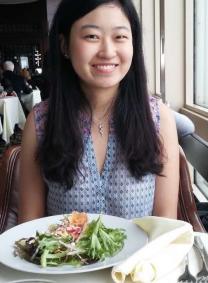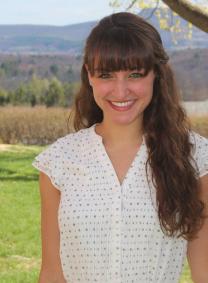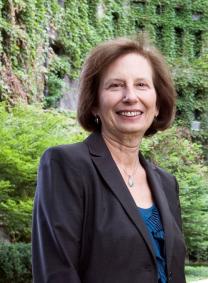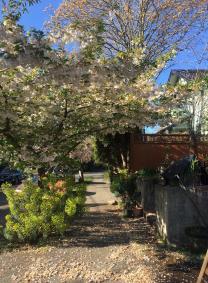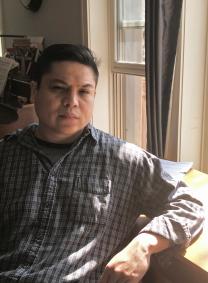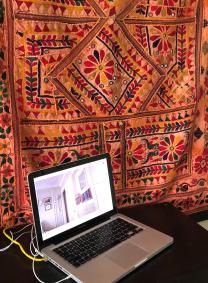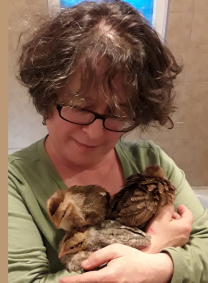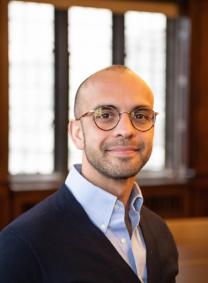Spring Quarter Snapshots
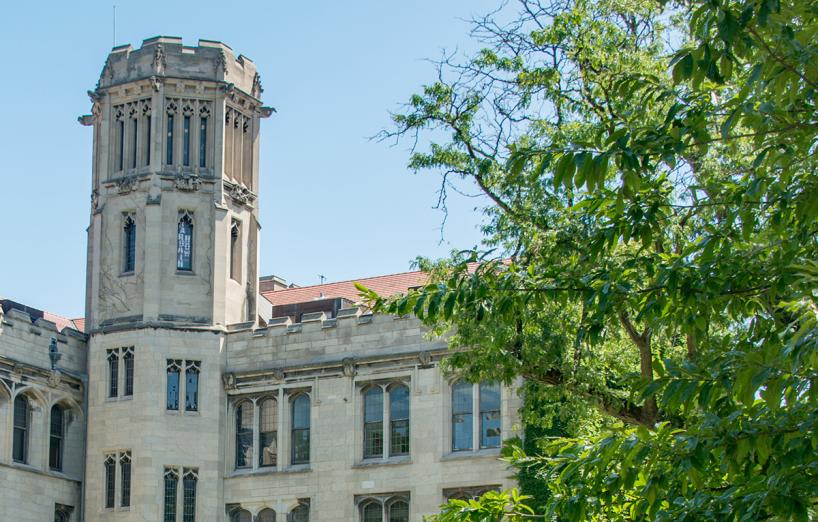
Students, faculty, and staff are adapting to the remote nature of the Spring Quarter. In this Snapshots series, members of the Division community offer insights into their experiences of learning, teaching, and working away from campus.
May 21, 2020
Jiaxu Han
2nd-Year MACSS Student
I am a planner and consider myself a “indoorsy” person. So, at the beginning of the Spring Quarter, I think working from home will not be too difficult. A few weeks later, I found myself overwhelmed by the uncertainties that the whole situation brought in. My struggles are not so different from other graduating students or immigrants. My parents will not be here to share the moments when I graduate, and I don’t know when I will be able to see them again due to the travel ban. I am not sure when I will start my job and also don’t know if I will have less chance of getting into a Ph.D. program next year. Luckily, I received much support and good advice from members of UChicago community: my preceptor, advisors, lab mates, and several friends. Their kind words and encouragements really granted me some relief from all the stress. It makes me realize that it is not really the problems per se, but the feelings of dealing with all the problems alone, that makes things more difficult. I am very grateful for all the help that I received when I reached out.
As a planner, I used to be not very good at dealing with things that I couldn’t control, and now I am starting to appreciate the art of “living in the moment”. With that being said, I am learning to hold onto every little moment that brought me happiness: fun discussions in my online classes, lab meetings where I could hear all the exciting research ideas, meaningful conversations with my friends, small grocery trips with my husband and of course, paying off my house loans in Animal Crossing-New Horizon. This is not a time without happiness for me, and it makes many small things that I used to take for granted much more meaningful.
May 13, 2020
Brett Baker
Assistant Dean of Students
When our Dean of Students office staff left campus the week of March 16, I had no idea how long we’d be gone, but I wouldn’t have guessed I’d still be working from home in mid-May. My adjustment to remote working was swift and rather painless, and at this point going to the office seems like a distant memory.
Unlike instructors and students, my work didn’t rely on face-to-face interaction. That’s not to say that those encounters aren’t valuable. Talking to students in person provides a chance for clarity and conciseness that’s more difficult to achieve virtually, not to mention the advantages of simply being on campus and available for the various conversations that occur by chance. Most of my work was done via e-mail even while on campus, so transitioning entirely to e-mail wasn’t much of a chore. I do worry that students are hesitant to request phone calls or Zoom meetings for issues that ideally require something more than e-mail interaction.
My commute to work is almost exactly an hour, door-to-door, so having two additional hours per day – ten per week! – is nice. It’s been important to me to have a daily routine that divides my day into work and non-work hours, as much as possible. In the morning I still get ready as though I’m going to work, and then begin my day. At the end of the day I close my laptop and find a quick household chore to do just to get my mind back into living (rather than working) mode. Various Zoom meetings provide a chance to interact with co-workers, which helps ease the isolation, and the routine work dictated by the academic calendar provides a sense of normalcy.
My kids have written a daily journal since quarantine began. It will provide a good record of their lives at this unique time. I’ve recorded audio interviews with them, too, which I know will become priceless as years pass. I’ve been planning to begin a journal of my own, and this entry may provide the kickstart I needed!
May 10, 2020
Stephanie Ternullo
PhD Candidate in Sociology
When the stay-at-home order began, I was just about to hit the road for fieldwork. This, of course, was no longer possible. My dissertation follows three small towns in the Midwest throughout the 2020 presidential campaign. The research design depends on multiple rounds of in-depth interviews with voters in those communities and ethnographic observations of campaign activities. I had gone through a lot of stress, long weekends, and boxes of cookies during my second year to begin research before the 2020 campaign season, so the idea of staying home at first felt like a devastating blow. Ultimately, though, that work did pay off.
Because I completed a first round of interviews with voters last summer and fall, I had a group of people I could reach out to from my living room. So, for the past two months, I've spent dozens of hours on the phone with voters across the Midwest - still talking about their views on the presidential election, but also about how they're doing under the COVID constraints, how they feel about the government's response, and what their concerns are for the future. I feel fortunate to be continuing my research when this is not the case for many of my colleagues.
I also feel lucky to be connecting with the wonderful people in my study who have remained so generous with their time despite the current frenzy. These interviews are different from the first ones we did together. Multiple times in recent weeks, I’ve found myself telling my partner: “that was the hardest interview I’ve ever done.” But there are also bright spots – for example, a Zoom chat with a group of retirees I used to meet in a local coffee shop in one of my field sites. These connections matter for me, and I hope for them, too.
May 7, 2020
Susan Levine
Rebecca Anne Boylan Professor in Education and Society, Department of Psychology
I am finding the Covid-19 crisis challenging, I won’t lie. Like everyone, I really miss my family, friends, students and colleagues. I have a heavy teaching load this spring so needed to spend all of break improving my zoom and online lecture skills. Somehow lecturing online is much more difficult than in person. There is something about having a live audience that really helps. I keep thinking about the song Trevor Noah sang about how much he would miss his audience on the last live show he did as the Covid-19 crisis unfolded. My rule of thumb is that 1 hour of zoom time feels like 1.5 hours of actual time – it's exhausting.
That said, I am trying to focus on the positives. I really like connecting with my students and helping them get through a time that is very hard and uncertain for them. Their creativity in finding ways to launch on-line research at a time when in-person research is not possible is truly amazing. I am fortunate to be spending time with my husband Mike at our house in Michigan and taking walks in the woods and along Lake Michigan. My 1- year-old grandson, Mayer, is right next door and I get to see him play in the back yard with his Mom and Dad, and take social distance walks with them, which is a big highlight. It is wonderful to see Mayer toddling along holding his blue shovel, and sitting down to dig in the dirt or swing in the baby swing. I am having zoom dinners with friends and relatives who are far away, and we will continue to connect this way post-Covid. Finally, this time apart has increased my appreciation of being together on our beautiful campus. When we are able to come back, I think we will all do so with renewed energy and with greater passion for the work we do and compassion for those we work with.
May 1, 2020
Eliza Little
PhD Candidate in Social Thought
The COVID-19 crisis struck during a particularly frenzied moment in my graduate career. In addition to being in the process of finishing up my dissertation and beginning to hear back from applications sent off in the Fall, my March began with back-to-back conferences and all the accompanying social engagements. By mid-March when earnest social distancing went into effect, I was pretty relieved to have a break.
My relief didn’t last very long, though. My Chicago lease was up at the end of March, and I’d been planning to spend April and May visiting friends in various parts of the country while I finished my dissertation. That plan obviously had to be scrapped. Instead, I found myself living out a version of every independent adult’s worst nightmare: moving back in with my parents in Seattle. Luckily, my family and I get along very well, and we’ve actually had a lot of fun quarantining together. It’s springtime here, which means more in the pacific northwest than it does in Illinois—the weather is sunny and mild, and everything is blooming. I write outside in the garden every morning and then take a long walk along the beach.
In my spare time, I’ve started watching nineties medical drama ER (set in Chicago) to alleviate my homesickness. The other day a shot of one of the characters riding in a grubby ‘L’ car, staring out at the downtown skyline on a particularly oppressive winter day made me tear up a little bit. I realized just how much I miss the life I have lived for the past seven years in those surroundings—life as a member of the University, in which research is not an intangible and solitary activity carried out through the portal of a laptop screen, but, rather, a frenzy of classes, presentations, dinners and drinks after, all for the sake of thinking together.
April 29, 2020
Marco Garrido
Assistant Professor in the Department of Sociology
When I first heard that spring quarter classes would be online, I was dismayed. My teaching style relies heavily on face-to-face, in-classroom dynamics. During lecture, I ask students questions. I scan their faces for understanding. I'm able to get a gut sense of whether they're interested. The chemistry of every class is different, and it takes a few weeks to get a sense of it. I was worried that teaching remotely would deprive me of this sensory connection to the students. Even though I could see and hear them, I would be teaching "blind," so to speak.
I've taught a couple of classes through Zoom now, and, yes, it does feel like I have one hand tied behind my back. The students are just talking heads and I can't take in the room with a glance, but, that said, it's not so bad. There's still a strong interactive element to class. Students speak up. They ask me questions and challenge my interpretations, just like in the good old days. They're not laughing at my jokes as much, but maybe that's because they're on mute. (Or maybe, because they're relatively anonymized now, they no longer feel like they have to!) In any case, it feels good to be teaching again. And students have told me that it feels good to be in class again. In these unsettled times, there's something therapeutic about taking an hour and a half to really dig into and discuss ideas. The meaning of class is different. It feels a little bit like a break from, and maybe also a protest against, being in crisis mode. So there's this appreciation of the space class time affords that underlies classroom interactions now.
April 26, 2020
Victor Lima
Senior Lecturer in the Kenneth C. Griffin Department of Economics
Co-Director of Undergraduate Studies
On March 12, when I read the e-mail announcing that spring quarter would be remote, I was worried. So many things, both professional and personal, were about to change drastically and there was no prior experience that could guide me through what was about to unfold. We had just found out that we were going to shift 28 classes with approximately 2,000 enrollments to remote teaching and we had two weeks to design and implement our new pedagogical models. We needed to start out the quarter strongly so our students would feel that we were as committed as ever to their education.
As preparations for spring quarter came together over the next two weeks and the way forward became clearer, I could start to think about how the lock down would change life at home. I live by my myself so I knew my home would be very quiet. But, I was not prepared for the extended periods of silence that suddenly confronted me. And, as the lock down became stricter, the distance it placed between my colleagues and my students and I became a very difficult obstacle to overcome.
As spring quarter began in earnest, however, I realized that the challenges that had worried me a few weeks prior presented many opportunities, if only I looked at them in the proper light. Silence and distance need not be enemies. I realized that the colleagues I know best are the ones who are nearest me. But, this proximity prevented me from really getting to know other colleagues, with whom I have worked for many years, because they were farther away. Now that everyone is a “zoom call” away, Friday happy hours have been a great way to get to know these colleagues better. It is ironic that being farther apart, in the traditional sense, has brought us so much closer. And, silence. Silence is now a friend who helps me to focus, think, and gives me the confidence to know that it is possible to overcome the obstacles that worried me so much only a month ago.
April 23, 2020
Anjali Anand
PhD Candidate in Political Science
Somewhat eerily, my life under the shelter-in-place order has not been too dissimilar from my life before COVID-19 forced us all indoors. As a graduate student in the late stage of writing the dissertation, I already spend most of my time at home, in front of a computer, working alone on a complicated and maddening project. My experience of this lack of change, in the midst of massive societal upheaval, has made me re-think what I have come to see as a normal routine for the past several years. For me, the silver lining of the shelter-in-place order is the manner in which it has forced me to build times into my schedule to see family, friends, and co-workers through Zoom or FaceTime, or to check in through a simple phone call.
The life of a researcher is often a solitary one, but the current situation has taught me how to cope with that isolation for the first time. Socializing with friends used to feel like a guilty pleasure. There was and is always more work to be done, so having long conversations or dinners or too many coffee dates in the same week seemed wasteful and unproductive. The shelter-in-place order removed all of these as options, forcing me and others I know to value the time we could have been spending together but now can’t. In the forced isolation, I have found that we have been more determined to find time to “see” each other, without the accompanying dread of falling behind on work, which has quite rightly taken a backseat to our own sense of well-being. For that reason, I hope some of the changes we have made in how we stay in touch and how we prioritize seeing each other persist, even when campus and our workplaces re-open.
April 20, 2020
Dean Clason, Pre-award Grants Administrator
Meredith Clason, Faculty Affairs Administrator, Sociology
The concept of working from home used to sound like a luxury, but it has certainly turned out to be different than we expected. In addition to we two UChicago employees, there are two young Clason siblings, one trying to keep up with her college work and the other her high school curriculum, and we are taxing our internet connection beyond its limits to keep up with the exorbitant bandwidth we are generating. It really isn’t a joke that Dean and I attend the SSD coffee breaks together to save bandwidth!
We miss our offices with their ergonomic chairs and multiple screens. We miss being able to do things quickly and efficiently with all of the necessary tools on hand. But most of all, we miss people. We will never again underestimate the power of walking to the next office to bounce ideas off of our colleagues or running into people in the halls.
Still, our silver linings are many. We don’t run out of hot water with everyone taking showers before 8:00 a.m. Meredith finally has an office dog and usually office cats and a has converted a dresser into a standing desk. Dean has a lovely view of the backyard from his office and can enjoy the antics of the wild birds and squirrels. He also has office chickens. We can have lunch together and walk the yard to get a bit of vitamin D therapy. And we are safe and – knock wood – healthy. Even with all the inconveniences, we have a tremendous amount to be thankful for and feel like we are, for the most part, managing the new abnormal.
April 16, 2020
David Ansari, PhD’18
Teaching Fellow in the Social Sciences
Department of Comparative Human Development
As with many of my colleagues, I have been concerned about cultivating a sense of community in my classes as we move to remote teaching. I teach seminars with 15 to 25 students, which do not easily lend themselves to being carried out on Zoom or similar platforms since facilitating group discussion involves reading the room to pick up subtle cues and to know when and how to shift the conversation. This becomes a lot harder when there are a dozen or two small squares with people’s faces, virtual backgrounds, microphones that may or may not be muted, and unsteady internet connections.
My spring class was supposed to be scheduled at 9:30 am Chicago time, my students left campus and relocated all over the world. Some are in Chicago, but others are located in California, England, Maryland, Australia, and Singapore. To ensure that my class would be accessible (and enjoyable), I decided to create a semi-synchronous experience. I record lectures and my students and I meet over Zoom in small groups. I polled my students for meeting times, so that nobody would have to partake in discussion in the middle of the night or at the crack of dawn. I now have 46 students, perhaps because students can take this class alongside others scheduled at the same time. Our class also explores the social determinants of health, which is an even timelier topic than usual given our current circumstances.
Currently, I have six groups of 6 to 9 students, and I meet with each group for 30 minutes every Tuesday and Thursday. Being in small groups and meeting for a shorter period of time has proven to be quite a remarkable experience. Our discussions are focused, everyone participates, my students are getting to know each other, and technical issues have been quite minimal. My students tell me that they like having the structure and interaction of twice per week calls that do not feel too taxing because of their short duration. My peers ask me if I am exhausted from six Zoom calls per class day. I love it—each group engages with the material in different ways. All of my students are brilliant and kind and interested in the material, and I am lucky to have a wonderful teaching assistant.

